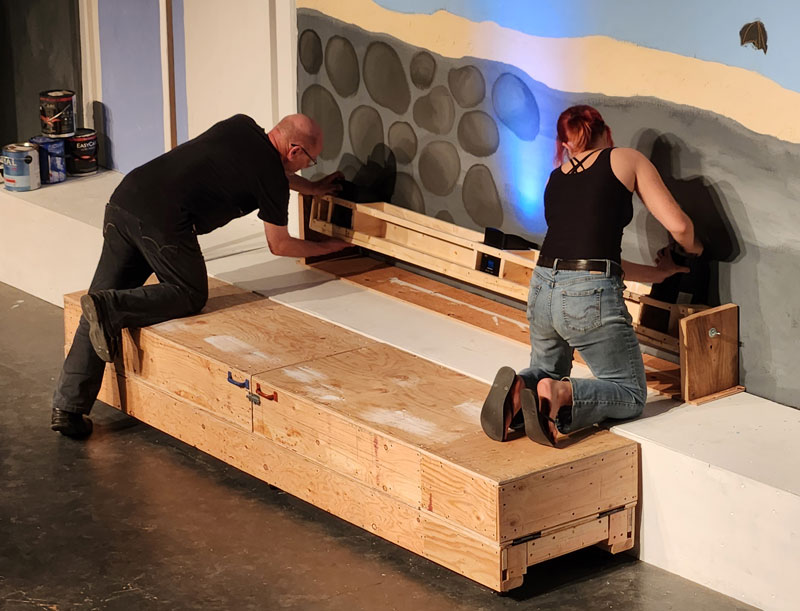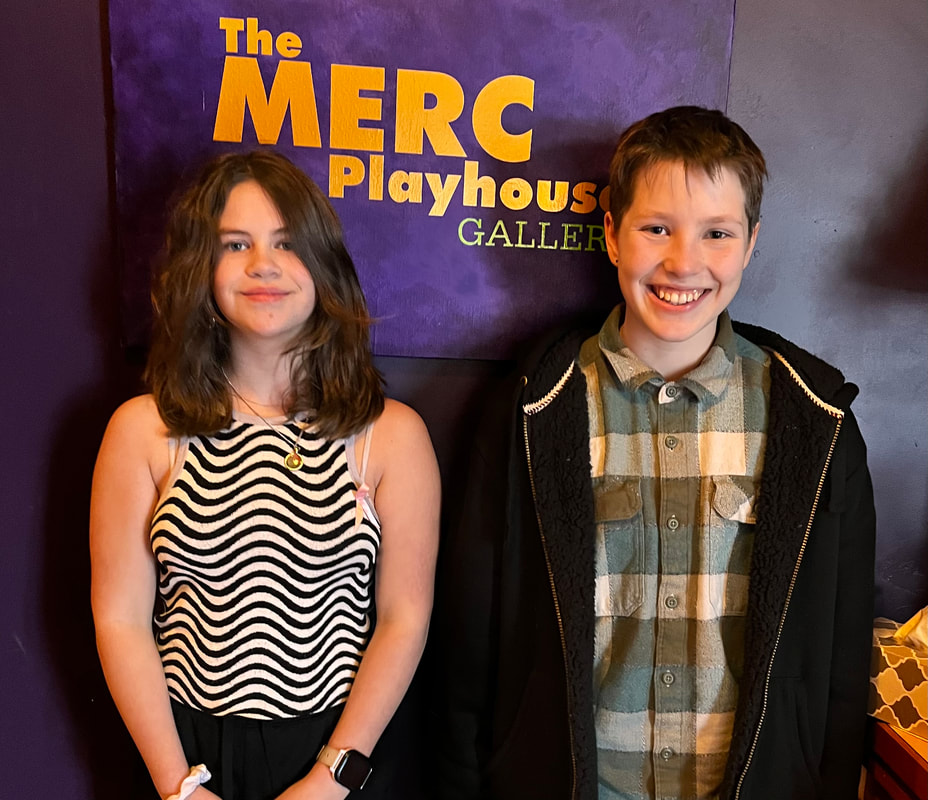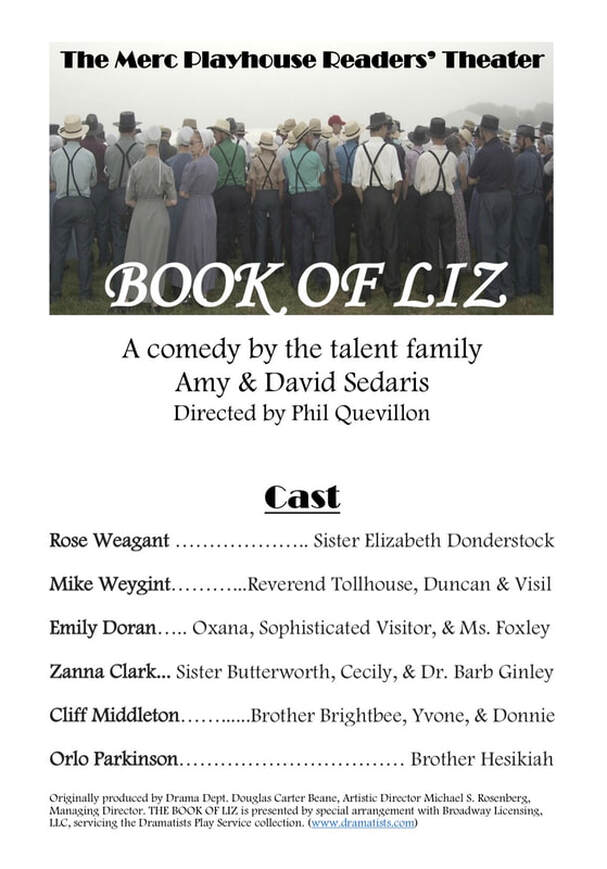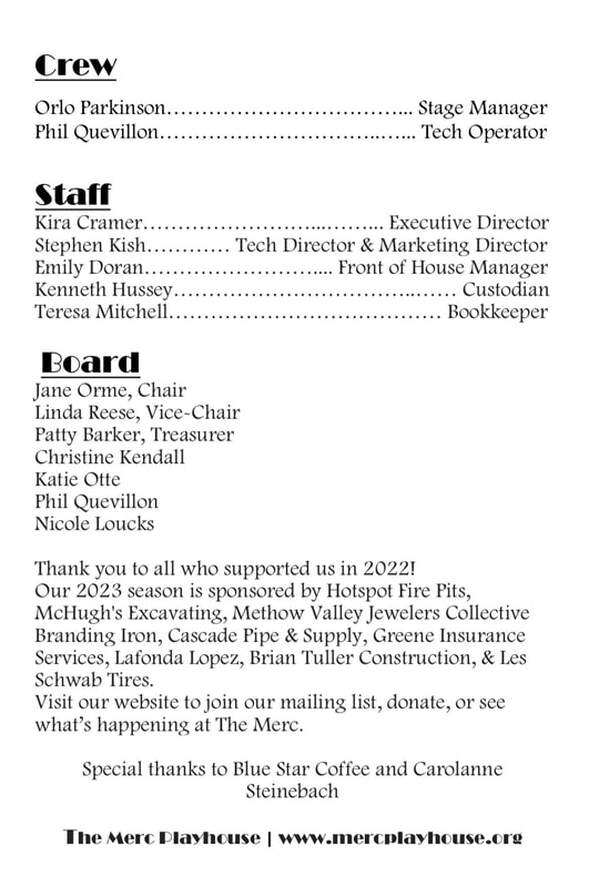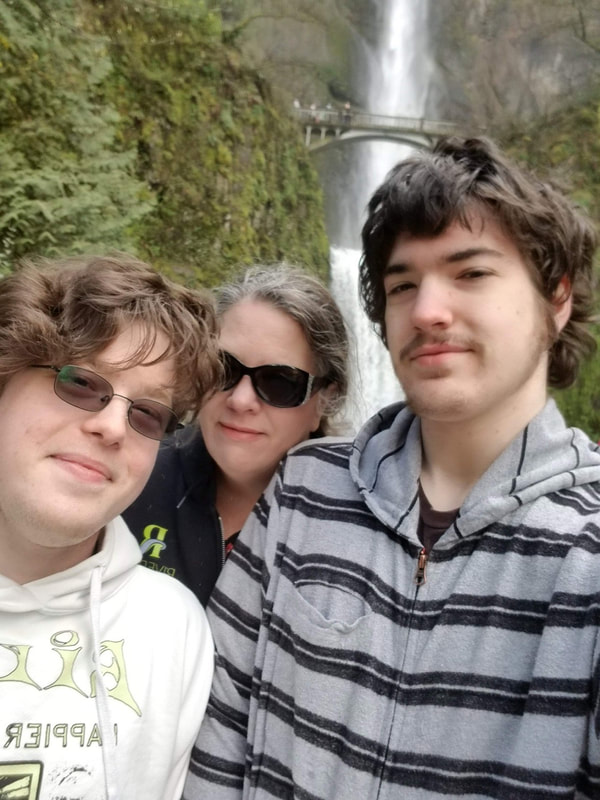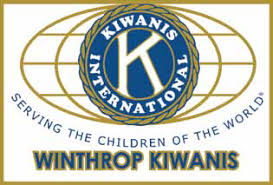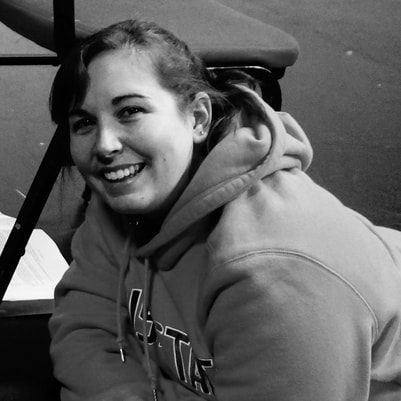 Interview by Anne Anderson This month’s E-Blast interview is with an important member of our Merc Community you may not know (unless you have small children who do theater in the summer!) Her name is Megan Hicks, and her summer camp is one of the reasons that our other youth performances are always stellar! Megan teaches middle school theater during the school year and produces a head spinning number of plays with, and for, young people throughout the fall/winter/spring months. But at least for two weeks in the summer, she belongs to The Merc, and we are so lucky to have her! Her first experience with The Merc was actually as an actress playing “Sally” in The Merc’s summer outdoor production of “You’re a Good Man, Charlie Brown.” We'll let her tell the rest of the story in her own words… Tell us about your past experience with theater. I started doing theater in 7th grade. I auditioned for the school musical and then a community theater show on a whim. It became a passion and now I teach junior high theater and direct, choreograph, and act at various community theaters. What excites you about live theater? You never know what is going to happen. The energy of the audience is a special feeling that can’t be matched and kids tend to blossom when they hit performances with a live crowd. Why is it important in a small community like the Methow Valley? I am amazed at the quality and amount of theater thriving in the valley. Theatre is a way to step into someone else’s world. It develops empathy and compassion. It also builds teamwork and communication skills. For the audience, it is a chance to escape the world and experience something new. Can you share a unique experience you have had in a theater setting... as an actor or director? My first introduction to Twisp and the Merc was performing in You’re a Good Man, Charlie Brown. I auditioned in Seattle and got a callback. Being unaware of The Merc Playhouse or the Methow, I posted on Facebook. Turns out, I have friends that know Julie (who was directing the show). They said she is awesome and the Methow Valley is beautiful, so I said yes to the show. The cast and stage manager lived together and we went on many adventures. We spent 4 weeks rehearsing during the day, and then performed 4 weekends at the Twisp and then Winthrop parks. It was an amazing experience. The week before our final weekend of performances, we floated the river. I collided with a log and I think the log won. Pretty sure I got a concussion so that last weekend was a little rough. But the cast was amazing and we all put on a great show. When Julie moved out of the valley, they asked me to run the summer camp and I’ve been doing it ever since. It is a highlight of my summer each year! What draws you to a particular script like The Claw or past camp scripts? Sometimes a show is chosen for the name. We want kids to sign up and be excited for camp. This year we went with something unknown. The Claw has really fun characters and references to 90s cartoons and toys. The Flair Bears are reminiscent of the Care Bears. The Mighty Mutant Power Turtles are a combo of the ninja turtles and power rangers. And of course there are some Beanie Babies. The music is very catchy and I’m looking forward to working on it. The show also has a great message of friendship and trying new things. We are going to have a blast diving into the characters and story this summer! As a director, what do you hope to accomplish? When working with kids in theater, I always hope they have fun and enjoy performing whether it is their first show or twentieth show. Throughout the week, we will work on being confident onstage while singing, dancing, and acting. We will work on projection (speaking loudly) and creating characters through our voices and movement. We will work together as an ensemble to bring this story to life and share it with the audiences. Who should consider attending performances of The Claw? Everyone! Kids and adults will get something from this show, and it may be different for everyone. Our camp shows are always amazing (especially since the kids learn it all and memorize their lines in one week). Just a couple of other facts about Megan you might enjoy … she has an awesome, supportive hubby named Travis who often comes along at camp time, but may have to stay home this summer with their two adult dogs and five tiny young puppies! Be sure to say “hi” to any or all of them if you see them in the valley! SPOTLIGHT ON DON NELSON, ACTOR & DIRECTOR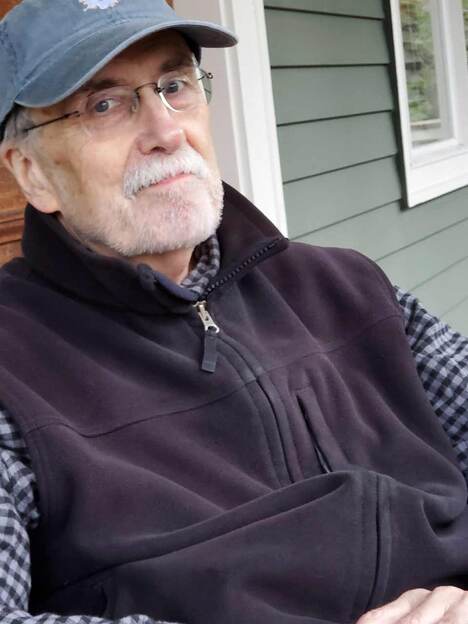 Don Nelson Don Nelson Interviewed by Kira Cramer, Executive Director KIRA: Tell us about your experience with theater. DON: Before I connected with The Merc, my last acting had been in a high school production of The Mouse That Roared. I played a crazy general, I think. About 10 years ago, Jane Hubrig and Ki Gottberg convinced me to take a role in Twelfth Night, which Ki was directing with a Western setting. I played Sir Toby Belch, a drunken womanizer, so typecasting right off the bat! I don’t know what I was thinking going straight from nothing to Shakespeare, but I had a great time with the cast and crew and have been hooked ever since. I also acted in a Readers Theater production of Morning’s at Seven, and a full production of The Importance of Being Earnest (so, I went from a drunken womanizer to an Anglican minister — easy transition). I rehearsed for the full production of The Real Inspector Hound, but had to drop out at the last minute because of a medical issue. Big disappointment, especially in that it turns out my character was in fact the “real” Inspector Hound. I have directed two Readers Theater productions (The Gift of the Magi and The Lifespan of a Fact) and one full production (Rope). Each was a different experience, all were incredibly rewarding. KIRA: What excites you about live theater? DON: Engaging with the audience, taking them to someplace they have never experienced for a couple of hours. During that time, the audience and cast agree to suspend disbelief and remove themselves from the rest of the world, in a shared space. It’s intimate, personal and often emotional. And there’s the uncertainty of being “live” — it’s like a tightrope walk every night. You have to be OK with that challenge, as nervous as it might make you (and I am always nervous). KIRA: Why is it important in a small community like the Methow Valley? DON: It’s a creative outlet and opportunity for people who thrive in that kind of environment (and it seems there are plenty of us). For audiences, it’s a chance to experience excellent and diverse productions and enjoy the creative talents of people they know. For me, it’s a way to not be “the publisher” for a while, and take part in something I enjoy. KIRA: Can you share a unique experience you have had in a theater setting... as an actor or director? DON: In a broader sense, I have realized (and used to my advantage) that there are similarities in what I do as a newspaper editor and what I do as a director. The parallels are interesting. I explored that connection in an essay I wrote for Nieman Storyboard, a website devoted to narrative writing and editing skills. You can find it at The role of editor as director. The one generic lesson I’ve learned is that, when you are putting a play (or a story) together, everything is intentional. KIRA: What draws you to a particular script like Rope or The Lifespan of A Fact? DON: I like intriguing, nuanced characters and moral ambiguity. Rope was a psychological thriller that posed questions about how far someone would go to prove their beliefs. Lifespan took on a hot-button topical issue that is not easily resolved, as we learned from a very well-written script which gave each of the characters a lot to do. KIRA: As a director, what do you hope to accomplish? DON: For the audience, I would hope they’d come away asking questions and talking about what they just saw. For the cast, I would like them to feel invested in the characters and be respected for their efforts to inhabit the roles; and to feel like part of a supportive team. I’m not a taskmaster director, I don’t think — I try to convey my sense of what the play is attempting to accomplish, and what each character contributes to that. But I do go in with a very clear idea of what I want to happen. KIRA: Anything else you would like us to know? DON: There are all kinds of ways to get involved in community theater, and every one of them is crucial to a successful production. You don’t have to act or direct to have a meaningful “role” in bringing a play to life. A lot of behind-the-scenes work goes into making it possible for those actors to walk out on the stage every night (and they are grateful for it). 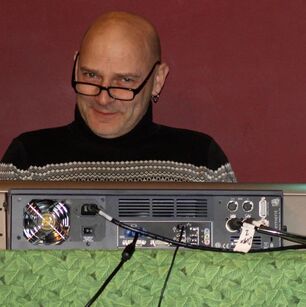 Danbert Nobacon Danbert Nobacon This month’s spotlight shines on Danbert Nobacon — band performer, actor, director, stage manager, playwright, promoter, producer, sound designer, light technician, set designer and teacher (to name just a few theater-related accomplishments). Danbert’s passion for the stage started in England when he was with the band Chumbawamba, but after moving to Twisp in 2011, it has evolved into acting and working behind the scenes at The Merc Playhouse and the Liberty Bell Drama Company. Danbert comments about his gradual, yet persistent, involvement into the theatrical world: “When we were in a band, we would occasionally meet people who were into theater. They would do performances outside in the walkways. I always thought theater people were a bit … well … I didn’t quite get it until I did it. People call it the magic of theater.” Danbert first discovered The Merc’s theater magic in 2011 with A Christmas Carol, where he played the ghost of the future — and that led to an extensive resume of time spent on our stage. He has been cast, in lead or supporting roles, in The Merc’s productions of Miracle on 34th Street, I Hate Hamlet, Murder by The Book, The Real Inspector Hound, and The One Act Play That Goes Wrong. Somewhere along the way, Danbert saw an ad in the newspaper that Liberty Bell was hiring a high school drama teacher. He applied and, in 2014, directed Mirificus High at The Merc, one of two plays co-written by students in the drama class. The second one was Brain Circus. In 2016, when English teacher Kelly Grayum was looking to add an elective to his schedule at Liberty Bell, it made sense for Danbert and Kelly to join forces. The first show they co-directed was Footloose. The high school program has evolved mightily since then. The Merc now happily partners with the Liberty Bell Drama Company to bring their productions to the stage. Each fall, Danbert and Kelly co-direct one-act plays. In the spring, the drama company produces a musical. Kelly directs and Danbert builds the set as well as assisting with the behind-the-scenes elements of the show. Danbert and Kelly have discovered that, through the process of putting on a production, the students’ progress, in terms of sense of accomplishment and self-confidence, is immeasurable. The two instructors have come to realize that the lessons of theater cannot be taught; they must be experienced. Directing for Liberty Bell has piqued Danbert’s interest in the behind-the-scenes aspects of theater, which include set building, sound designing, stage managing, and tech operating. When asked about the value of community theater, Danbert responds, “I think it’s an amazing thing to have a community theater — in this day and age in particular — when so much entertainment is at the tips of our fingers with the click of a button. Performing is the oldest art form, because way before the ancient Greeks, people probably gathered around a campfire and entertained each other by pretending to be someone else. I think it is who we are as homosapiens.” 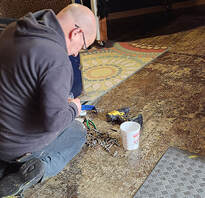 Regarding theater involvement, Danbert comments, “If you have the slightest bit of interest, I would recommend getting involved. It brings something out of you as a person. I never saw myself as a naturally expressive person, but being in the theater has expanded my horizons of what performance can be.” He further describes how involvement in theater is impactful, saying, “That feeling when you're doing the show and have confidence, energy, and adrenaline – it’s different every night. Even though it’s the same words and the same people, it’s almost like surfing and you’re riding a wave. The audience is reacting. You can’t understand it until you do it, the joy that it brings.” Thank you, Danbert, for the joy you continue to bring to The Merc Playhouse and your tremendous work with the Liberty Bell Drama Company. Jane Hill
Interview by LInda Reese, Merc Board Member Jane Hill has been a vital asset to the Merc since her arrival in the Methow Valley. As she described it, she was with a group of people at the Merc when the play Murder by the Book was being produced. The person manning the light board had just backed out, and someone asked the group, “does anyone possibly know how to run a light board?” Jane said she “timidly raised her paw,” was given the job, and has been active at the theater ever since. Jane moved to the valley from Illinois in 2014 to be closer to her son, Paul, and his family. In Illinois, she taught high school English and was active in her local community theater. She was on stage in several productions, played historical characters in reenactment presentations, and thankfully, learned how to run the light board. When she discovered that Twisp had a live theater, she knew she’d be happy living here. At first she simply looked forward to attending performances, but after contributing her technical skills, she was asked to join the Merc Board, and we’ve benefitted from her decision-making and leadership skills, as well as her genuine love of theater, ever since. During her years here, she has served as both vice-chair and chair of the board, worked lights, performed on stage (including her recent role of the key juror in our readers’ theater production of Twelve Angry Women), performed numerous behind the scene duties, and helped the Merc survive the two-year pandemic shutdown. Unfortunately for us, she recently had to step away from the board due to our bylaws’ limited terms, but we’re fortunate that she continues to serve on the programming committee. When asked what the most fulfilling or rewarding aspect has been while volunteering at the Merc, Jane responded, “the absolute most rewarding thing to me has been observing the transition that has happened while I’ve been here- from a time when there was a very proficient artistic director who was guiding the theater, but as far as I was concerned, we were acting under the auspices of the artistic director instead of being a real community theater. So one of the things I’ve seen is the transition to a real community theater.” Jane explained that this transition has been supported by both our current and our past executive directors as well as the past three board chairs. She finds it gratifying to see the connection that the Merc has with our schools, which includes working with our high school students and providing them with an actual professional stage including professional light and sound systems while they’re still in high school. She also finds it rewarding that we have children’s productions, like Beauty and the Beast, that draw a full opening night house where people have to be turned away. Jane encourages anybody to volunteer and get involved with the Merc. “If you like to be present and see plays, come help us in the concession booth… that’s a simple way to get started. If you know something about technology, especially theater technology, step up and let us know that. And if you’re interested in being on the board, approach somebody and say you have an interest.” When asked if there was anything else she’d like to add, Jane shared a book she’s been reading titled Smile: a Memoir, written by Sarah Ruhl, an award winning playwright and essayist. Like the author, Jane said she’s a wordaholic. “I love words. I love what words can do. I love the sounds they make. I love the way they feel in my mouth. The one thing the author said in her book that really resonated with me was when she saw her productions on stage, she said it was her words in three dimensions.” Thank you, Jane Hill, for all your work in keeping community theater alive in the Methow and giving us all the opportunity to see words in three dimensions! Amanda Fine, Stage Manager and Stage Mom written by Jane Orme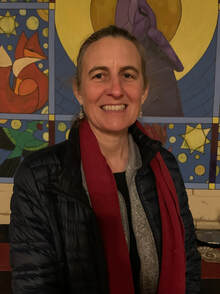 Amanda Fine is a jewel–she is stage manager for Beauty and the Beast. As the director of said show, I am so lucky to have her by my side, so before you read further about this remarkable volunteer extraordinaire, let me say thank you so much for all you do for The Merc Playhouse! As stage manager, Amanda Fine works closely with me and the actors. Amanda explains how she landed at The Merc: “I was happy I was available and could say YES! My son (Orlo) is in the show and I thought it would be a great way to meet some of the younger members of our community.” Amanda attends all rehearsals, “holding book” so that when actors forget a line, she prompts them, and working with actors on entrances, exits, and transitions backstage. Also at rehearsals, she takes detailed notes from Missi’s choreography sessions. During all of the performances, Amanda is the “go-to” for costume changes, props, problem solver, timekeeper, and full-fledged “Manager of Backstage.” I asked her to “Sell” Beauty and the Beast to our readers and here’s what she said: “It is a classic story. You will be amazed how poignantly these kids portray their roles. You will love the energy on stage. You will see the love that has gone into making the magic happen. The cast has worked hard and they are ready to entertain YOU!” I couldn’t describe it better. The first time I heard about Amanda’s generosity as a volunteer was when she opened her home to one of our directors of The Merc Children’s Camp last summer for a week! Then she played Annie in The One Act Play That Goes Wrong in the fall. Volunteerism runs in the family. Her son Orlo has either been in or stage managed every show at The Merc since July, and her husband designed and built a fantastic set piece for Beauty and the Beast. Who is Amanda Fine? Amanda grew up outside Philadelphia and participated in school theater productions but chose another path in college. She completed a veterinary degree at the University of Pennsylvania and later took up a position in Mongolia, where, as she describes, “my career evolved from livestock medicine to wildlife conservation.” She married, had Orlo, and after eight years in Mongolia, they lived and worked in Viet Nam. From Viet Nam, they moved to Twisp in the summer of 2021. It was in Mongolia that Amanda reconnected with theater. She tells this amazing story below: “When living in Ulaanbaatar, Mongolia, I was part of a community theater group called the UB Players. One of the more memorable events was a full production of The Sound of Music directed by the US Ambassador. I was asked to be the stage manager for the production and the cast and crew were an eclectic mix of diplomats, international school teachers, Peace Corps volunteers, missionaries, and some very talented Mongolian musicians. It was incredible to see the show come together through the collective efforts of people from so many different countries and walks of life.” So what brought Amanda, her husband, and Orlo to the Methow? She states that in many ways Twisp reminds them of the small town life they experienced while living and working in Mongolia. They were familiar with the valley and its many wonderful ski trails. Amanda says The Merc Playhouse is a “very special place” with its dynamic live theater scene providing so many opportunities for youth. The Merc brings people together and “gives individuals a place to shine.” Thank you, Amanda, for being the stage manager for BATB, for sharing Orlo with us, and having a husband who is willing to contribute his expertise. We are so thrilled to have Amanda on our team! Rowan Kelley & Asher Fisher Interview by Anne Andersen, Merc Board Member Have you ever wondered what it would be like to be in one of the Merc’s amazing children’s theater productions? We thought we would find out by talking to Rowan Kelley and Asher Fisher, two cast members of “Beauty and the Beast,” currently in rehearsal at the Merc.
First of all, I asked the two of them about their past experience in theater. Rowan, a sixth grader at Liberty Bell High School remembered that the first thing she did at the Merc was a summer theater camp. She loved that and went on to audition for a part in “The Fantastic Mister Fox.” She was cast in the role of Ms. Fox. She then played the part of one of the Candy Cane Guards in the holiday production of “The Nutcracker.” She realizes that when she lived in Seattle, she would never have had these wonderful opportunities, so she loves being involved in a small community theater like the Merc. Asher, a seventh grader at Liberty Bell High School, shared that he has really not done anything before “Beauty and the Beast,” except some fun plays with friends and a role in the Missoula Children’s Theater earlier this school year. Since they are playing the important parts of “Beauty” (Rowan) and “Beast” (Asher), I wanted to know what it is like for them to be in this particular play. Rowan explained that this might be her favorite role at the Merc because the rest of the actors in this play are so good and so well cast, and it’s really easy to work with them. She really likes the positive message of the play and the great characters in the story. Asher shared that for him, the play is quite fun, although he does have a lot of lines to learn and not enough time to memorize them! He thinks that it is easier to learn his lines while moving his body around on stage. I asked them both what they say to other kids who might be thinking about auditioning for a Merc play but are wondering if they could do it. They both said that, “the directors here, like Ms. Orme, are really great and do not judge you at all. They’re not harsh and they take you as you are … work with what you’ve got.” Their advice was, “don’t be scared to put yourself out there.” They both agreed that they have learned a lot about theater in all of the productions they’ve been in, and that starting with a small role and working your way up to a major role is a good way to build your confidence. When I asked if there was anything else they wanted to add, both Rowan and Asher agreed that theater is, “a really fun thing to do and it’s a great way to express your emotions, express yourself, and work with a character that you like. It is not too hard, so you should put yourself out there and give it a try!” They wished that there was more theater at school but that overall, the Methow Valley provides lots of great opportunities. Asher said that he thought the world should be “covered” with acting because it helps you in a lot of ways that don’t have anything to do with theater, like building confidence, using your voice, and just being generally better. I honestly don’t think any of us at the Merc could have expressed the importance of theater any better than these two! Be sure to come and see Rowan and Asher, and all of the amazing cast of “Beauty and the Beast,” in March! January 6 & 7, 13 & 14 @ 7:00 PM
Sunday January 15th @ 2:00 PM Doors open 30 minutes prior to show TICKETS: $10 at the door, no advanced sales WHAT TO KNOW: Sister Elizabeth Donderstock is feeling unappreciated in her Squeamish community and decides to try her luck in the outside world. She abandons her fellow brethren to their own devices in making her famous cheese balls. They quickly discover that her cheese ball recipe cannot be recreated and panic that she has sabotaged their recipe. Can the Squeamish be saved? Will the cheese balls ever taste the same again? Spotlight on The Hussey Family Interviewed by Anne AndersenTheaters survive on the shoulders of behind-the-scenes workers who create sets, operate tech, build and collect props and sew costumes, all without a single standing ovation. We are so lucky at The Merc to have an entire family that has the skills and knowledge and most importantly, the interest and passion for theater to play these critical "roles" in performance after performance. They are amazing, as you will soon realize after reading this interview! Enjoy and thank the wonderful Hussey family, Darla, Dean and Kenny, the next time you see them!
1) How did each of you first get involved at The Merc? Dean: When we moved here, mom figured The Merc would be a good way to make friends. They needed a sound tech for Willy Wonka in 2014 and zip, zap, zop, here we are. By the way, mom was right — I have made amazing friends here. Darla: I moved my family here to take a job at the MVN. I tried to get the kids involved in things to help them make friends, The Merc seemed a perfect fit for Dean. As a former (but never re-formed) theater nerd, it was only a matter of time until I followed along. I dipped my toes in when I helped Dean master the tech for the real-time sound mixing used in Diabolical Elixir (it was overwhelming for a 14-year-old guy). And it was all over when Rod Molzhan asked me to do the face painting for Wind in the Willows in 2016. Kenny: I was the only human in the 2016 production of Wind in the Willows. 2) What different kinds of roles have you filled on stage or behind the scenes? In which productions? Dean: With the exception of The Curious Incident of the Dog in the Night, my contributions have been in the sound category. I’ve been the go-to sound tech for years and I’ve done a lot of sound editing and mixing. I have even written some original music — Bike America’s soundtrack was my senior project & I’ve done some original songs for The Nutcracker this year. I took to the stage for The Curious Incident … because, as an autistic person, I wanted to lend my lived experience to this important production. You asked which productions — there are 28 on my Merc resume, so if you want me to list them, let me know. Darla: I have run sound, I have run lights, I have been stage manager for a couple of shows, I’ve dressed the windows in balloons, and designed posters & playbills. I have done props, I have done a LOT of makeup and a LOT of costumes. I think I worked concessions once or twice. I don’t know that I could pull together a complete list, but notables: First time with the face paint was Wind in the Willows … I think I helped with costumes on that show as well. Props: Peter Pan, where most props and some costumes were done with balloon twisting. The Nutcracker: Creating 65 costumes. Kenny: I performed in pretty much every kids' show from Wind in the Willows until Fantastic Mr. Fox (the original cast). I ran the lights for the Fantastic Mr. Fox redux … that was bittersweet. Running the tech booth is fun with Dean and I’m doing lights for The Nutcracker now. Recently, I’ve been hired as a custodian for The Merc. Mom ropes me into modeling a lot of costumes, but we won’t talk about that. 3) What is your favorite experience at The Merc? Explain! Dean: Hands down, Bike America. Writing the entire soundtrack and experiencing the cast & audience's reactions was amazing. It inspired & emboldened me to write other soundtracks … you should check my Sound Cloud account https://tinyurl.com/35m4kckv to hear one I’m writing for my favorite book. Bike America showed me that my disability doesn’t define my ability to do important things with my talents. I didn’t use to know that. Darla: Watching my kids grow from young boys struggling to fit into the world into talented, confident young men who know they are valued by the entire Merc family. As a single mom to two kids with some extra challenges, the acceptance, support and love we’ve found in this theater have made all the difference in our worlds. I am somewhat obsessed with making sure other people — especially kids — who need a place to belong can find it here. Kenny: Being a crocodile with a balloon tail. It was ridiculous and the metallic leggings were the height of fashion. 4). What has been your biggest learning curve/challenge working at The Merc? Your biggest success? Dean: My biggest challenge is trying to balance “hell week” and help my mom run our store. This is a lot harder to do when working than it was when I was going to school. My biggest success was being the second recipient of the Carolanne & Egon Steinbach Volunteer Award … my mom was the first ever & I got the award on my birthday. It made me feel like I had done something very important. Darla: Costuming the Nutcracker has been the biggest logistical challenge … it’s a lot of costumes that need to be staged in a tiny little space. Logistically, it will also either be my biggest success or … unsuccess … depending on how it all goes! Painting the faces of 20 wiggling actors in an hour is a pretty close second (that’s 3 minutes per face, by the way) … Kenny: Early on, it was hard to figure out how to express emotions with physical actions. Nonverbal communication skills are a struggle for many autistic people — acting has helped me with that a ton. Recently, my brother needed me to take over as sound tech for a show and I only had a couple of days to learn it … that was scary … but I did fine. He’s a good teacher. 5) As our premier theater “family,” what is it like being involved with The Merc together? Could you recommend it to other families? Dean: It’s fun, but it’s also exhausting. Watching the costumes come together is pretty cool — I’m learning things from my mom I wouldn’t have learned otherwise. The way she imagined, invented and then made The Nutcracker’s tea bandoliers was super interesting. Darla: It’s like being that crazy, embarrassing parent at your kids' sports games except there aren’t any referees and they let you play as well. Every time I am part of a multi-generational production, I see adults discovering newfound respect for young people & young people realizing that adults aren’t actually evil overlords. I love it every time I get to work side by side with my kids, even when it’s hard … I am always learning new things about them. I highly recommend it to other families. Kenny: We don’t do a whole lot together except theater. We used to hike sometimes, but now that we’re older and mom & Dean run the print shop, theater is the thing we all do together. And I have a lot of memories of doing theater together. I would absolutely recommend it to other families … spending time together however you can is good. 6) Finally, what are some of your most memorable moments at The Merc? Funny, scary, embarrassing, etc. Dean: I had to learn a new sound software & do one of the hardest sequences I’ve ever done for Chicago — that was scary. Darla: Fixing someone’s costume by cutting apart hair ties and tying them together to make elastic. I think we were trying to hold up pants … I was terrified that one of the knots would come untied. I now pack an entire toolbox of costume rescue options to every production. I just spent pretty much the entire Thanksgiving Day working on last-minute costumes with my mom. While it may not have been a Norman Rockwell-worthy holiday, it was an amazing way to spend time together building memories. Every production has new worst/best/mosts and they are always priceless. Kenny: The backstage shenanigans of young actors are many. Getting dressed in a closet with 8 other boys is the only really unpleasant thing I can recall. The live band in Twelfth Night was a very memorable experience and very different. 7) Anything else you want to say??? Last chance!!! Dean: I really appreciate all of the opportunities that The Merc has given me and the things I’ve been able to do because of my work at The Merc. Darla: So many things. The arts are SO important in a community, but what The Merc brings to the actors & the community transcends cultural contributions. Theater can make audiences see things from a point of view that doesn’t come naturally to them … our theater also helps the cast & crew see themselves in ways they might never have otherwise believed possible. Kenny: I like the opportunity that it gives me to be part of a larger team effort and make it come together. It’s beautiful to see the culmination of everyone’s hard work come to life. It’s painful when we have to strike the show, but also wonderful knowing we made something unique together. |
Site Search:
MENU
Thank you to our sponsors!
The Merc Playhouse | 101 S. Glover Street | PO Box 425 | Twisp, WA 98856 | 509.997.7529 | [email protected]
The Merc Playhouse is a registered 501(c)3.
The Merc Playhouse is a registered 501(c)3.

